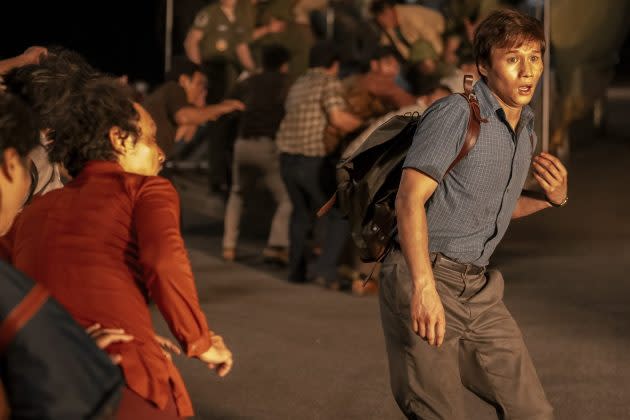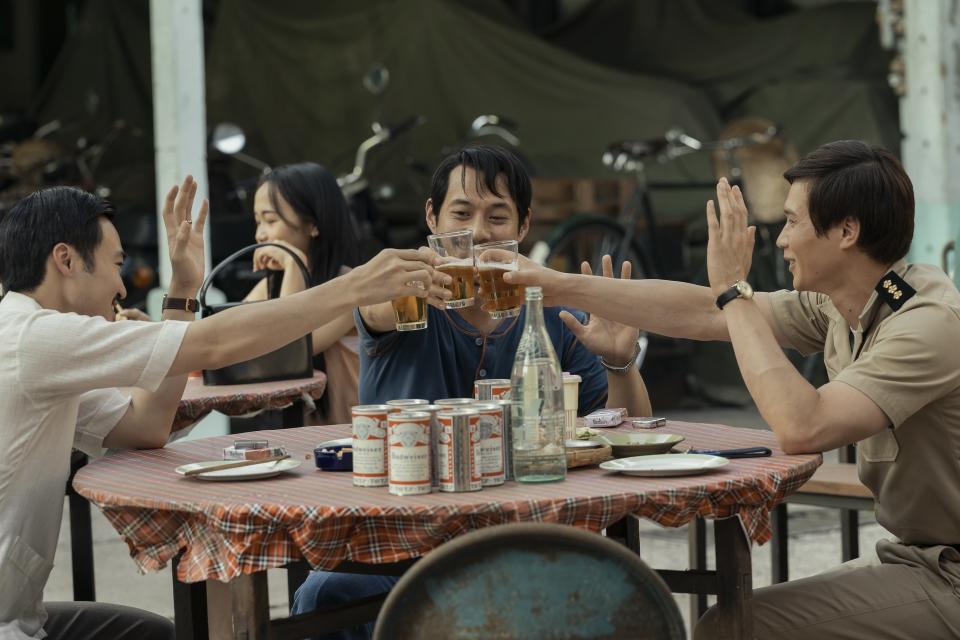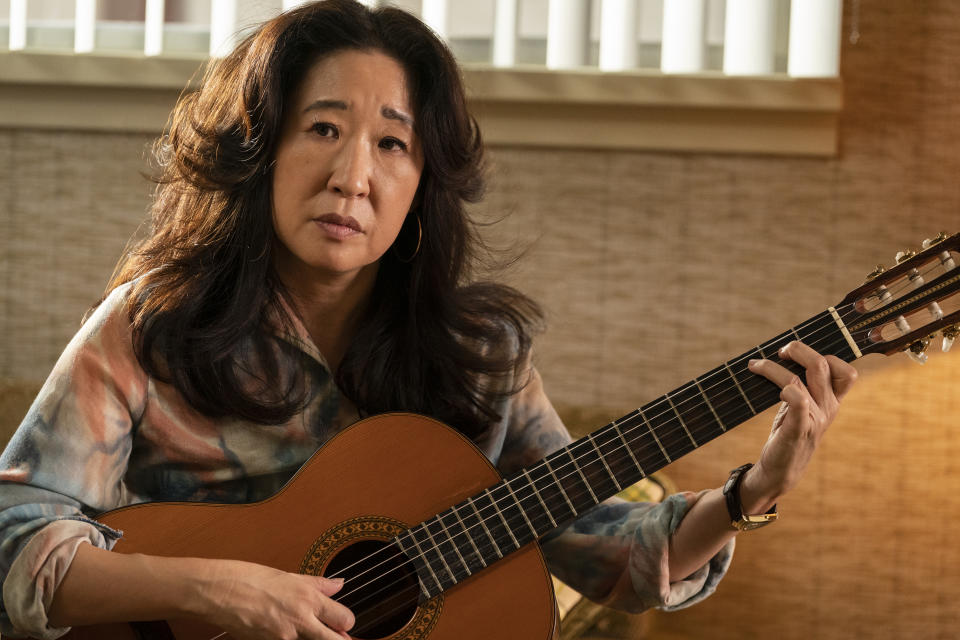How ‘The Sympathizer’s’ Depiction of the Vietnam War Helped Its Cast Make Sense of Their Heritage
- Oops!Something went wrong.Please try again later.
- Oops!Something went wrong.Please try again later.
- Oops!Something went wrong.Please try again later.

About a month ago, “The Sympathizer” star Fred Nguyen Khan lost his grandmother.
She was a Vietnamese refugee who sought asylum in Canada, enduring a “staggered escape” that left her and her siblings terrified they wouldn’t survive or see each other again. But were it not for the show, in which Khan now plays a refugee himself, he may never have heard that story.
More from Variety
Set at the end of the Vietnam War, “The Sympathizer” follows a captain in the U.S.-backed South Vietnamese army (Hoa Xuande) who’s secretly spying for the North Vietnamese communists. As Saigon falls and the U.S. retreats, the Captain (as he’s called throughout) remains embedded and escapes to the Los Angeles while continuing to report back to his side about the dealings of the General (Toan Le) and his men — including one of his best friends, Bon (Khan), who knows nothing of the Captain’s true politics. Narrating his espionage experiences in the form of a written confession after he’s been caught and imprisoned, the Captain is plagued by his own conflicting beliefs: his loyalty to his original cause, and his understanding of the beliefs of people he’s spent years betraying. War, it turns out, is never black and white.
And it often produces a culture of silence.
“People from that generation, they don’t like to talk about the traumas they endured. They like to bottle it in. The only way they can cope with it is: They work hard. They get results,” says Khan, who grew up in Montreal. In an interview alongside three of his castmates, Khan recalls that for several of the show’s older actors, revisiting this moment in history made for a major moment for catharsis: “There’s a lot of crying, there’s a lot of hugging, and then actually starting to talk about it. It was such a big breakthrough for a lot of people, and even in my family. Once I wrapped the show, I was able to ask questions. [My grandmother] sat us all down and told us the story about how they escaped. I didn’t know what it was like, because as a kid, you don’t ask.”

“The Sympathizer,” which premieres on HBO and Max on April 14, is based on Viet Thanh Nguyen’s 2015 novel of the same name, which won a Pulitzer Prize and is widely lauded for inverting the perspective on the war that American media typically privileges. In Vietnam, the book has never been published. While the government has never issued an official ban, the author has written about his inability thus far to penetrate the bureaucracy, saying it’s “clear” that “the enormous hurdles” he’s faced trying to get “The Sympathizer” into the country are political in nature.
Duy Nguyễn — who plays the Captain’s handler and best friend, Man — grew up in Hanoi within the culture that produced those hurdles.
“When I read the book for the first time, actually, I was mad,” he says. “What I’ve been taught in Vietnam, it’s only one side of the truth — just like American movies. I was like, ‘You’re not supposed to do this! That’s not the teaching!’ But then I read it again. And I read it again. And I read it again.”
“I understand that deep down, despite the political spectrum, whatever — these are just human beings,” he continues. “Their actions are what they think is best for their country. Neither is right or wrong. I am a completely changed human being after all the research I’ve done. I have become the sympathizer by the end of it.”
“My parents, I remember them telling stories of the past, and you’re just always brushing it aside,” says Xuande. “Maturing now, I was ignorant to these parts of the story that are really a part of who I am now. I feel a little bit ashamed that I never really took that part of my parents’ story seriously.”
Sandra Oh, who plays the Captain’s eventual girlfriend Sofia Mori, challenges Xuande: “I always want you to be gentle with yourself. Because the shame of not knowing the history, actually, I think comes from a deep need to assimilate. There are complicated things of why we assimilate the way that we do, and what we need to reject just to survive. But what is very, very healing is embodying the story that has not been told.”
Take it from her character: Sofia “believes she is a very liberated woman, a very progressive woman. But through this series, you see her start questioning her identity and wondering where she actually comes from,” Oh says. Though her character is Japanese, while Oh is the daughter of Korean immigrants, she relates to the way Sofia’s life changes after realizing the way she’s been prioritizing her Americanness above all.
“It’s Ms. Mori questioning her own hypocrisy, and I always do. Here I am, an Asian American woman of this era — you need to do this all the time, to wonder where you stand on things, and how deep you are actually going. Most everyone does have generations of trauma, and people don’t want to talk about it. My parents went through occupation, two world wars, then immigrated here. They don’t talk about it.”

“The Sympathizer” also allowed its cast to satirize the role American culture has played in sweeping their family history under the rug. In one episode, the Captain works as a cultural consultant on the set of Hollywood film about the war with a not-so-subtle resemblance to Francis Ford Coppola’s “Apocalypse Now.”
"The Sympathizer" star Hoa Xuande on working opposite Robert Downey Jr. in the HBO series: "He's just so crazy and fun and generous…He invokes that play in you." https://t.co/N7EjvV0Sda pic.twitter.com/h2f507Bb39
— Variety (@Variety) April 15, 2024
The film is helmed by a character played by Robert Downey Jr., who also plays nearly every white role on the show in a series of dramatic transformations. As the director specifically, Xuande praises Downey for “embodying the cultural institution that was Hollywood for awhile: telling stories that didn’t necessarily necessarily belong to Hollywood, and shaping it in a way that was palatable to a very Western-centric audience that didn’t necessarily listen to or care about the perspectives of the source.”
“It was such a brilliant directorial choice, that casting,” says Oh about Downey’s five roles. “The persona and who Robert is, and who he has represented in other characters — you can’t help but have that lend meaning that he is playing these archetypes of Western white patriarchy.”
In particular, she notes how Downey’s years of playing Marvel’s Iron Man — a character who works in weapons manufacturing — colors her view of his performance in “The Sympathizer.”
“Here you are, bringing that history to play, again, these archetypal pillars of education, of arts and culture, of politics, of spycraft, of government. It pushed all of the satire. He has so much strength as an actor. He is willing to go into the satire, he’s willing for his character to go into the racism.”
Sandra Oh, who stars in "The Sympathizer," unpacks Robert Downey Jr.'s performance as multiple characters in the HBO series: "He is playing these archetypes of Western white patriarchy…You're going to glean a lot of meaning from that." https://t.co/N7EjvV0Sda pic.twitter.com/r0iZns18ug
— Variety (@Variety) April 15, 2024
Though “The Sympathizer” is billed as a limited series, the cast seems open to returning for more. The material is certainly there, as Nguyen published a sequel titled “The Committed” in 2021.
“There’s some stuff that I feel like I can’t yet talk about because this is a series of books. Viet has not yet finished the third book,” Oh says. “But I think in that, he’s also interested in exploring much more of where Ms. Mori is coming from.”
That would also allow more depth and backstory for the brotherhood between the Captain, Bon and Man, who sliced their palms together in childhood as a vow of devotion. That oath contorts over time, stretching in an attempt accommodate the political divides that open up between three characters. It’s their ties to each other as the war ends and Vietnam transforms that gives “The Sympathizer” its title.
“To speak about the bond between the blood brothers, chosen family — I came to Montreal alone. I craved a family here in Canada, and then I found Fred,” says Nguyễn, as he and Khan’s friendship predates their casting in the show. “Immediately I was like, ‘OK, he’s my family now.'”
“I’m glad we get to show that,” he concludes, in tears. “No matter who you are, you can still treat other human beings like human beings.”
Best of Variety
Sign up for Variety’s Newsletter. For the latest news, follow us on Facebook, Twitter, and Instagram.

